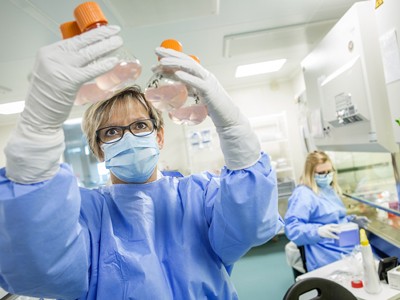Genethon Joins U.S. Bespoke Gene Therapy Consortium Dedicated to Finding Treatments for Ultra-Rare Diseases
Genethon, a unique non-profit gene therapy R&D organization founded by the French Muscular Dystrophy Association (AFM-Telethon), announced today it has joined the U.S.-based Bespoke Gene Therapy Consortium (BGTC) launched in October 2021 by the Foundation for the National Institutes of Health (FNIH) as part of its Accelerating Medicines Partnership® (AMP®) program.

Genethon, a global leader in gene therapy development for rare and ultra-rare diseases, is the only European non-profit research organization in the BGTC. The consortium is a public-private partnership bringing together the resources of the U.S. National Institutes of Health (NIH) and Food and Drug Administration (FDA) with biopharmaceutical companies and other non-profit groups. The goal is to speed development of customized (or bespoke) gene therapies for millions of people worldwide suffering from ultra-rare diseases.
“The Bespoke Gene Therapy consortium is highly strategic as it aims to build an innovative pathway for gene therapy for ultra-rare diseases,” said Frédéric Revah, Ph.D., Genethon’s CEO. “At Genethon, for nearly 20 years, we have been devoting our efforts and our expertise to the development of these breakthrough therapies for rare diseases with results that today show it is possible to overcome diseases long considered incurable. We are proud to contribute to the research of the Bespoke Gene Therapy Consortium. It is an opportunity which we sincerely hope that Europe will also seize.”
Among the 8,000 rare diseases worldwide, 85% are ultra-rare, meaning they have a prevalence of less than one person per million people and may affect fewer than several hundred or only dozens of patients. In addition, many of these diseases are linked to mutations or changes in a single gene, making gene therapy a potential curative treatment for patients that have long been excluded from all research.
However, ultra-rare diseases represent a major challenge in terms of development, clinical trial design and economic model. Traditional marketing mechanisms are unsuitable and drug makers who, in recent years, have been pioneers with these diseases, are gradually refocusing on the most frequent rare diseases or on common pathologies.
BGTC has defined the following objectives:
- Basic research: better understand the basic biology of adeno-associated viruses (AAV) in order to optimize bioproduction technologies and increase their therapeutic efficacy.
- Clinical research: create a development model to shorten the time between preclinical studies and human trials. 3 to 6 trials should be funded under this program.
- Bioproduction: design a standard set of analytical tests for the manufacture of viral vectors. Analyzes that are broadly applicable to different manufacturing methods could improve and speed up the manufacturing and production processes of genes and vectors.
- Regulatory requirements: Streamline regulatory requirements and processes to expedite approvals from health authorities, in this case the FDA.
Genethon is pleased to join this partnership that includes 31 partners spanning the public and private sectors. Additional details can be found here.
Find out more
The foundation for the National Institutes of Health

